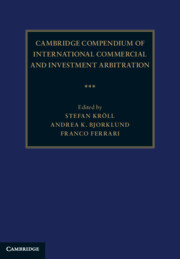Book contents
- Cambridge Compendium of International Commercial and Investment Arbitration
- Cambridge Compendium of International Commercial and Investment Arbitration
- Copyright page
- Contents
- Figures
- Tables
- Contributors
- Preface
- Part I Foundations
- Part II Public Law Questions Relating to Arbitration
- Part III Stakeholders in Arbitration
- Part IV Applicable Law
- Part V Jurisdiction of the Arbitrator
- 23 The Arbitration Agreement: Legal Nature, the Contractual and the Jurisdictional Aspect
- 24 The Various Forms of ‘Consent’ in International Arbitration
- 25 Protecting and Challenging the Arbitrator’s Jurisdiction
- 26 The Competence-Competence Principle’s Positive Effect
- 27 The Competence-Competence Principle’s Negative Effect
- 28 The ‘Separability’ of the Agreement to Arbitrate
- 29 Admissibility versus Jurisdiction
- 30 Settlement Efforts and Contract Adaptation by Arbitral Tribunals
- Part VI The Arbitral Tribunal
- Part VII Procedural Questions in Arbitration
- Part VIII Role of State Courts in Arbitration
- Part IX Awards
- Part X Post-Award Issues
- Part XI Legal Concepts
- Part XII Areas of Concern
- Part XIII Arbitration and Related Fields
- Part XIV EU Law and Arbitration
29 - Admissibility versus Jurisdiction
from Part V - Jurisdiction of the Arbitrator
Published online by Cambridge University Press: 18 February 2023
- Cambridge Compendium of International Commercial and Investment Arbitration
- Cambridge Compendium of International Commercial and Investment Arbitration
- Copyright page
- Contents
- Figures
- Tables
- Contributors
- Preface
- Part I Foundations
- Part II Public Law Questions Relating to Arbitration
- Part III Stakeholders in Arbitration
- Part IV Applicable Law
- Part V Jurisdiction of the Arbitrator
- 23 The Arbitration Agreement: Legal Nature, the Contractual and the Jurisdictional Aspect
- 24 The Various Forms of ‘Consent’ in International Arbitration
- 25 Protecting and Challenging the Arbitrator’s Jurisdiction
- 26 The Competence-Competence Principle’s Positive Effect
- 27 The Competence-Competence Principle’s Negative Effect
- 28 The ‘Separability’ of the Agreement to Arbitrate
- 29 Admissibility versus Jurisdiction
- 30 Settlement Efforts and Contract Adaptation by Arbitral Tribunals
- Part VI The Arbitral Tribunal
- Part VII Procedural Questions in Arbitration
- Part VIII Role of State Courts in Arbitration
- Part IX Awards
- Part X Post-Award Issues
- Part XI Legal Concepts
- Part XII Areas of Concern
- Part XIII Arbitration and Related Fields
- Part XIV EU Law and Arbitration
Summary
A decision which does not respect jurisdictional limits may be annulled by a controlling authority. But if there is no issue as to jurisdiction, then any issue as to admissibility is an objection to the claim (for example its prematurity or – at the other extreme – its staleness) and not to the forum. It follows that determinations with respect to should ordinarily be final and non-renewable. Once it is established that the parties have consented to the jurisdiction of a particular court or tribunal, there is a powerful policy reason – given the multiplicity of for a which might otherwise come into play internationally, with incompatible outcomes – to recognize its authority to dispose conclusively of other threshold issues.
Keywords
- Type
- Chapter
- Information
- Publisher: Cambridge University PressPrint publication year: 2023

